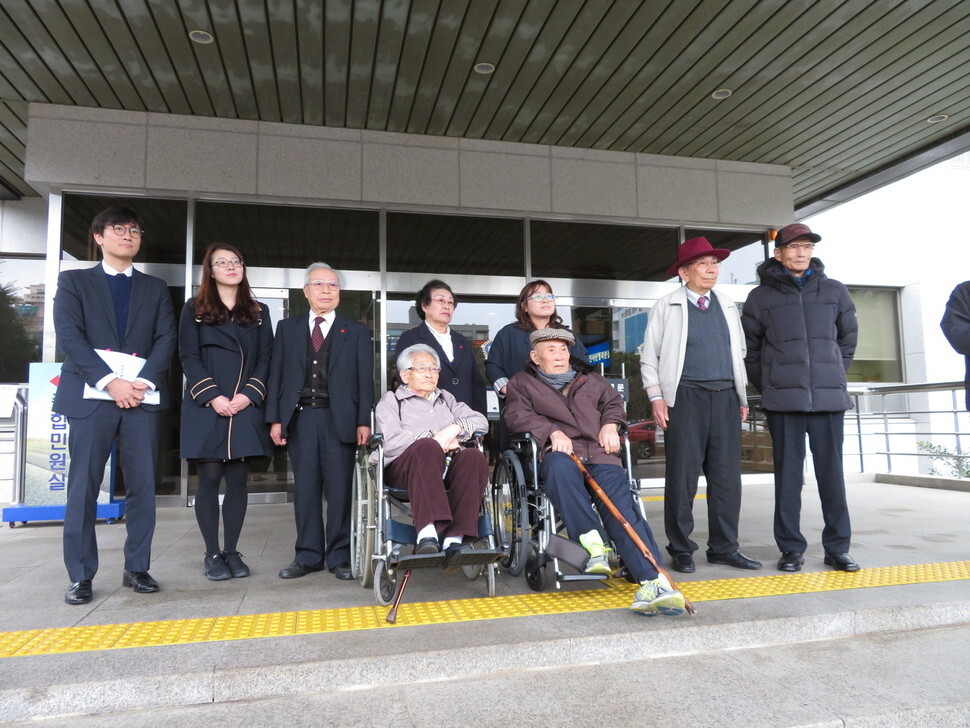hankyoreh
Links to other country sites 다른 나라 사이트 링크
Retrials to be held for victims of illegal detention and torture during Jeju Uprising

Retrials are to be held for 18 people sentenced to prison time in a court-martial after suffering illegal detention and torture during the Jeju Uprising of 1948–49. This marks the first-ever decision to begin retrials in criminal court in connection with the uprising.
“Almost no evidence has been found of arrest warrants for the retrial petitioners, some of whom were incarcerated in excess of 40 days or suffered harsh treatment such as physical abuse and torture during their questions,” the second criminal division of Jeju District Court (under judge Jegal Chang) said on Sept. 3 in announcing its decision to hold the retrials.
“As illegal detention and acts of violence were in violation of provisions in the Founding Constitution and the former Criminal Procedure Act at the time, grounds for retrial do exist,” the court concluded. The illegal detention and/or torture of government employees are viewed as representing grounds for retrial.
The key question in the case is the existence of final guilty rulings, which are a prerequisite for retrial. The Jeju Uprising prisoners were incarcerated in detention centers all around South Korea after being sentenced to prison time on charges of rebellion and espionage by two general courts-martial in Jeju in Dec. 1948 and July 1949 – but no surviving rulings or trial records have been found to exist. The only major record that has survived are in the form of a prisoner register, which records the name, domicile of origin, ruling, sentencing date, and place of incarcerate for 2,530 individuals.
Concluding that the prisoner register details were consistent with the petitioners’ statements, the court acknowledged the existence of a “final guilty ruling” – indicating that the failure to submit a written guilty verdict would not pose any issues for the retrial request.
“According to the prisoner register, the retrial petitioners were tried by a court-martial, which was in the position of exercising jurisdiction at the time,” the court said.
“The sentences, sentencing dates, and places of incarceration listed for the petitioners’ on the prisoner register were for the most part consistent with their statements,” it added.
The court also attached significance to “military enforcement directives” for two additional petitioners located during the trial process, 88-year-old Oh Young-jong and 93-year-old Hyun Woo-ryong.
“These directives would have not been drafted without the existence of some form of ruling by the law of the time against the corresponding retrial petitioners,” the court said.
Based on the various factors, the court concluded, “Regardless of whether the procedures of indictment, trial date selection, and sentencing for the retrial petitioners took place in a lawful manner, their transport to the mainland and incarceration in detention centers must be seen as having been made in the court-martial’s decision.”
In Apr. 2017, surviving former prisoners incarcerated at detention centers in Jeonju (eight), Incheon (seven), Daegu (two), and Mapo (one) at the time of the Jeju Uprising requested retrials after seven decades, asking for a “judicial ruling on acts of human rights infringement.”
By Kim Min-kyoung, staff reporter
Please direct comments or questions to [english@hani.co.kr]

Editorial・opinion
![[Column] Has Korea, too, crossed the Rubicon on China? [Column] Has Korea, too, crossed the Rubicon on China?](https://flexible.img.hani.co.kr/flexible/normal/500/300/imgdb/original/2024/0419/9317135153409185.jpg) [Column] Has Korea, too, crossed the Rubicon on China?
[Column] Has Korea, too, crossed the Rubicon on China?![[Correspondent’s column] In Japan’s alliance with US, echoes of its past alliances with UK [Correspondent’s column] In Japan’s alliance with US, echoes of its past alliances with UK](https://flexible.img.hani.co.kr/flexible/normal/500/300/imgdb/original/2024/0419/2317135166563519.jpg) [Correspondent’s column] In Japan’s alliance with US, echoes of its past alliances with UK
[Correspondent’s column] In Japan’s alliance with US, echoes of its past alliances with UK- [Editorial] Does Yoon think the Korean public is wrong?
- [Editorial] As it bolsters its alliance with US, Japan must be accountable for past
- [Guest essay] Amending the Constitution is Yoon’s key to leaving office in public’s good graces
- [Editorial] 10 years on, lessons of Sewol tragedy must never be forgotten
- [Column] A death blow to Korea’s prosecutor politics
- [Correspondent’s column] The US and the end of Japanese pacifism
- [Guest essay] How Korea turned its trainee doctors into monsters
- [Guest essay] As someone who helped forge Seoul-Moscow ties, their status today troubles me
Most viewed articles
- 1[Column] The clock is ticking for Korea’s first lady
- 2After 2 months of delayed, denied medical care, Koreans worry worst may be yet to come
- 3[Column] Has Korea, too, crossed the Rubicon on China?
- 4US overtakes China as Korea’s top export market, prompting trade sanction jitters
- 5[Correspondent’s column] In Japan’s alliance with US, echoes of its past alliances with UK
- 6Hong Se-hwa, voice for tolerance whose memoir of exile touched a chord, dies at 76
- 7All eyes on Xiaomi after it pulls off EV that Apple couldn’t
- 8[News analysis] After elections, prosecutorial reform will likely make legislative agenda
- 9More South Koreans, particularly the young, are leaving their religions
- 10John Linton, descendant of US missionaries and naturalized Korean citizen, to lead PPP’s reform effo